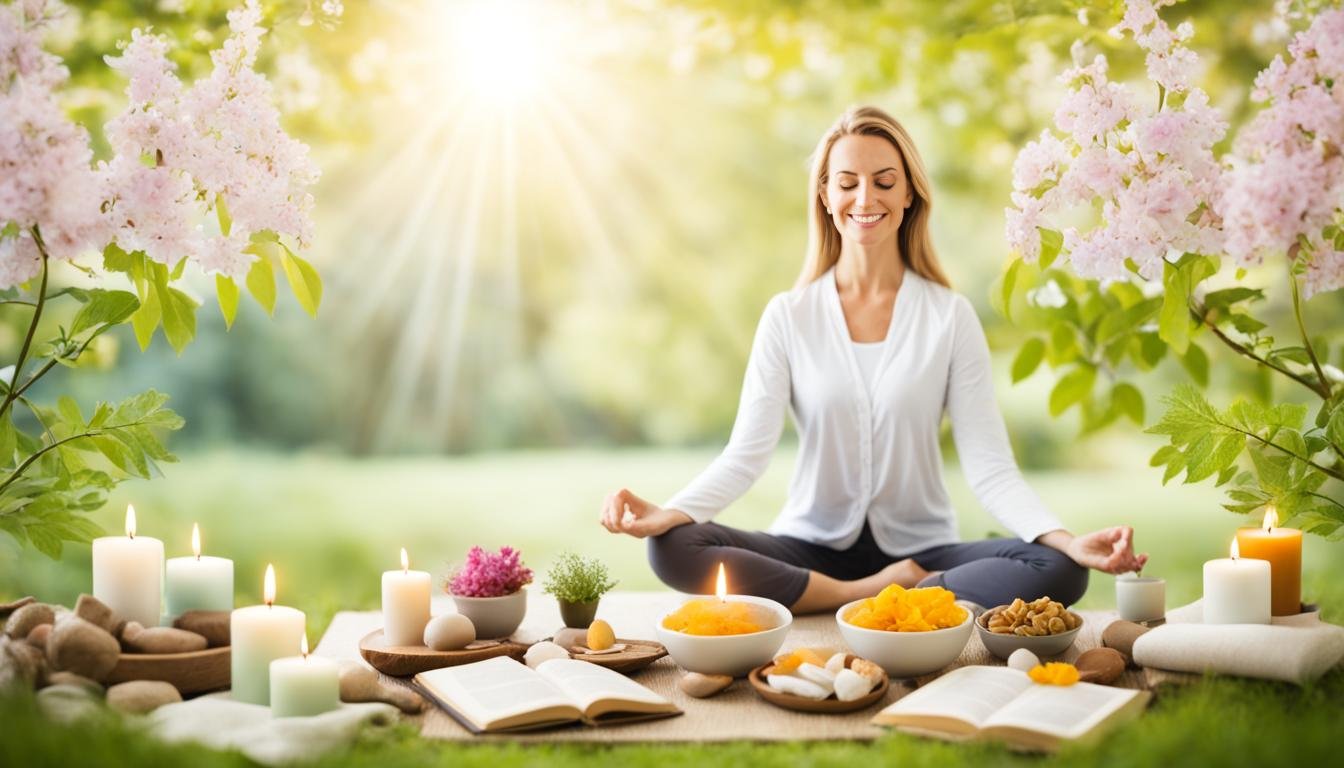Did you know that a staggering 87% of people report feeling overwhelmed by their daily responsibilities and stress levels? In today’s fast-paced world, it is easy to neglect self-care amidst the hustle and bustle of life. However, taking the time to prioritize self-care is essential for our overall well-being and quality of life.

Key Takeaways:
- Self-care is crucial for our well-being, yet often overlooked in our busy lives.
- Nurturing our mind, body, and soul is vital for maintaining a healthy and fulfilling life.
- Prioritizing self-care brings numerous benefits, including increased energy and improved emotional resilience.
- Practices such as mindfulness, exercise, and engaging in activities that bring joy and relaxation contribute to our overall well-being.
- Creating a self-care routine and seeking support systems are key strategies for making self-care a priority.
The Importance of Self-Care: Enhancing Well-being and Resilience
Neglecting self-care can have detrimental effects on our overall well-being. It can lead to burnout, increased stress levels, and diminished productivity. However, by prioritizing self-care in our lives, we can experience numerous benefits that contribute to our physical and mental health, as well as our emotional resilience.
Self-care is not selfish; it is a necessary investment in our well-being. When we take care of ourselves, we replenish our energy, improve our focus, and boost our emotional well-being. By making self-care a priority, we enhance our overall well-being and build the resilience necessary to handle life’s challenges.
Here are some key benefits of self-care:
- Increased energy: Self-care practices help recharge our physical and mental batteries, allowing us to approach life with energy and vitality.
- Improved focus: Taking care of ourselves helps clear our minds and enhances our ability to concentrate and stay present in the moment.
- Enhanced emotional resilience: Self-care builds our capacity to cope with stress and adversity, contributing to greater emotional resilience and well-being.
Investing in self-care is essential for maintaining our physical health and mental well-being. It is important to prioritize self-care in our daily lives to experience the full benefits it offers.
By understanding the importance of self-care and its impact on our well-being, we can make informed decisions to prioritize self-care, leading to a healthier and more fulfilling life.
Nurturing the Mind: Mindfulness and Mental Well-being
When it comes to taking care of our mental well-being, practicing mindfulness and incorporating relaxation techniques into our daily lives can make a significant difference. Mindfulness is the practice of being fully present and aware of the present moment, without judgment or attachment. This practice cultivates inner peace, reduces stress, and promotes overall mental health.
Meditation is a powerful tool that complements mindfulness, allowing us to quiet the mind and connect with our inner selves. By taking a few minutes each day to engage in meditation, we can find clarity, improve focus, and enhance our emotional well-being. Deep breathing exercises are also effective in reducing stress and promoting relaxation.
Journaling is another valuable practice for nurturing the mind. It allows us to express our thoughts and emotions freely, providing a release and a sense of clarity. Writing down our experiences, feelings, and reflections can bring about a greater understanding of ourselves and our emotions, promoting self-discovery and personal growth.
By incorporating mindfulness, meditation, deep breathing exercises, and journaling into our daily routines, we can actively promote our mental well-being and reduce stress levels. These practices offer a reprieve from the overwhelming demands of everyday life, allowing us to find balance and inner peace.
Embracing mindfulness and engaging in relaxation techniques is a powerful way to nurture our minds and promote overall mental well-being.
Taking Care of the Body: Physical Self-Care Practices
When it comes to self-care, nurturing the body is just as important as nurturing the mind and soul. Physical self-care practices play a vital role in maintaining overall well-being and enhancing our quality of life.
Regular exercise is an essential component of physical self-care. Engaging in physical activities not only helps improve our cardiovascular health but also releases endorphins, which are natural mood-boosters. From brisk walks in the park to yoga sessions at home, finding an exercise routine that suits your preferences and abilities is key.
Sleep is another crucial aspect of physical self-care. Quality sleep allows our bodies to repair and rejuvenate, promoting optimal physical and mental functioning. Aim for seven to nine hours of sleep each night, creating a peaceful sleep environment and establishing a consistent bedtime routine.
Nutrition plays a significant role in maintaining physical well-being. Fueling our bodies with a balanced diet provides the necessary energy and nutrients for optimal functioning. Incorporate a variety of fruits, vegetables, whole grains, lean proteins, and healthy fats into your meals. Stay hydrated by drinking plenty of water throughout the day.
Engaging in self-care activities that bring joy and relaxation is also essential for physical well-being. Whether it’s taking a leisurely bath, indulging in a hobby, or spending time in nature, these activities help reduce stress and promote a sense of overall wellness.
Remember, physical self-care is not a one-size-fits-all approach. Listen to your body’s needs and adapt your self-care practices accordingly. By prioritizing physical self-care, you can enhance your physical well-being, boost your energy levels, and maintain a healthier and happier lifestyle.
Nurturing the Soul: Emotional and Spiritual Well-being
While self-care involves caring for our physical and mental well-being, it also encompasses nurturing our innermost selves. Emotional self-care focuses on cultivating self-compassion, setting healthy boundaries, and participating in activities that bring joy and fulfillment.
Practicing self-compassion is an essential part of emotional self-care. It involves being kind and understanding towards ourselves, especially during times of difficulty or failure. By offering ourselves the same compassion we extend to others, we can cultivate emotional resilience and a sense of self-worth.
Setting boundaries is crucial for protecting our emotional well-being. It involves recognizing and honoring our limits to ensure that we have the time and energy to devote to our own needs. Establishing healthy boundaries allows us to maintain healthy relationships and prevent burnout.
“Boundaries are a sign of self-respect. They are the physical, mental, and emotional limits we establish to protect ourselves from being manipulated, used, or violated by others.”
In addition to self-compassion and setting boundaries, engaging in meaningful activities plays a vital role in nurturing the soul. Whether it’s pursuing a hobby, spending time with loved ones, or volunteering for a cause we believe in, these activities bring a sense of purpose and fulfillment.
Alongside emotional self-care, spiritual self-care is also essential for our overall well-being. It involves connecting with our inner selves and exploring our personal values and beliefs. Engaging in spiritual practices such as meditation, prayer, or reflection can provide a deeper sense of purpose and connection.
Connecting with nature is another powerful aspect of spiritual self-care. Taking time to appreciate the beauty of the natural world and immersing ourselves in its tranquility can bring a sense of peace and grounding.
Benefits of Emotional and Spiritual Well-being:
- Cultivating emotional resilience
- Enhancing self-esteem and self-worth
- Improving relationships and communication
- Fostering a sense of purpose and fulfillment
- Reducing stress and anxiety
- Promoting inner peace and harmony
Nurturing the soul through emotional and spiritual self-care is an integral part of leading a balanced and meaningful life. By practicing self-compassion, setting boundaries, engaging in meaningful activities, and connecting with nature, we can cultivate emotional well-being and find a deeper sense of purpose and fulfillment.
| Practice | Description |
|————————–|—————————————————————————————————–|
| Self-compassion | Being kind and understanding towards ourselves during challenging times. |
| Setting boundaries | Recognizing and honoring personal limits to protect emotional well-being and maintain healthy relationships. |
| Engaging in meaningful activities | Pursuing hobbies, spending time with loved ones, or volunteering for causes that bring joy and fulfillment. |
| Meditation | A practice that promotes mindfulness, relaxation, and spiritual growth. |
| Connecting with nature | Spending time outdoors, appreciating the natural world, and finding solace in its beauty. |
| Exploring personal values and beliefs | Reflecting on one’s beliefs and values to find greater meaning and purpose in life. |
Strategies for Prioritizing Self-Care
When it comes to self-care, establishing strategies can help ensure that we prioritize our well-being and make it a regular part of our lives. Here are some effective strategies to consider:
1. Setting Boundaries
Setting boundaries is essential for protecting our time, energy, and emotional well-being. By clearly defining what is acceptable and what is not, we can prioritize self-care without feeling guilty. This may involve saying no to commitments that drain us, setting limits on work hours, or creating designated time for self-care activities.
2. Creating a Self-Care Routine
A self-care routine is a structured schedule that allows us to regularly engage in activities that nourish and rejuvenate us. This can include anything from meditation and exercise to reading or spending time in nature. By incorporating self-care practices into our daily or weekly routine, we make self-care a non-negotiable part of our lives.
3. Practicing Self-Compassion
Self-compassion involves treating ourselves with kindness, understanding, and acceptance. It means acknowledging our limitations and imperfections and granting ourselves the same compassion we would offer a loved one. By cultivating a compassionate mindset, we can prioritize self-care without self-judgment or guilt.
4. Building Support Systems
Surrounding ourselves with supportive individuals who understand the importance of self-care can make a significant difference in our ability to prioritize it. By connecting with people who value self-care, we can gain encouragement, accountability, and inspiration to continue making it a priority in our lives. Support systems can include friends, family, or even online communities dedicated to self-care.
5. Seeking Professional Help
There may be times when self-care alone is not enough, and professional help is needed. It is essential to recognize when this is the case and to seek assistance from qualified professionals such as therapists or counselors. These professionals can provide guidance, tools, and techniques to prioritize self-care and address any underlying issues that may be affecting our well-being.
Strategies for Prioritizing Self-Care
| Strategy | Description |
|---|---|
| Setting Boundaries | Clearly defining limits and saying no to draining commitments |
| Creating a Self-Care Routine | Incorporating self-care activities into a structured schedule |
| Practicing Self-Compassion | Treating ourselves with kindness, understanding, and acceptance |
| Building Support Systems | Surrounding ourselves with supportive individuals |
| Seeking Professional Help | Consulting qualified professionals for guidance and assistance |
Personal Care: A Holistic Approach
In today’s fast-paced world, personal care encompasses more than just external grooming or skincare. It is a holistic approach to nurturing the mind, body, and soul, promoting overall well-being and balance. By prioritizing personal care, we can enhance our physical health, support our mental well-being, and cultivate emotional balance.
When we talk about personal care, we are not only referring to self-care activities like indulging in a relaxing bath or treating ourselves to a spa day. While these activities are certainly part of personal care, they are just the tip of the iceberg.
Personal care goes beyond surface-level maintenance and extends to practices that promote self-love, self-discovery, and self-compassion. It involves nourishing our bodies with nutritious meals, engaging in regular physical activity, and establishing healthy sleep patterns.

A holistic personal care routine also addresses our mental well-being. It includes practices like mindfulness, meditation, and stress reduction techniques to calm the mind, reduce anxiety, and promote mental clarity.
Emotional balance is another crucial aspect of personal care. Taking care of our emotions involves practicing self-compassion, setting boundaries, and engaging in activities that bring us joy and fulfillment.
By adopting a holistic approach to personal care, we are investing in our overall well-being. It is not just about looking good on the outside; it is about feeling good on the inside and nurturing a deeper connection with ourselves.
Personal care is a continuous journey that requires self-reflection, self-awareness, and self-improvement. It is a commitment to prioritize our own needs and well-being, allowing us to show up as the best version of ourselves in all aspects of life.
Next, we will explore specific strategies for nurturing the mind, body, and soul as part of our personal care routine.
Nurturing the Mind: Practices for Mental Well-being
Nurturing the mind is essential for maintaining optimal mental well-being. By engaging in relaxation techniques, self-reflection, and activities that promote creativity, we can cultivate a positive and resilient state of mind. Taking the time to give complete attention to daily tasks, practicing self-compassion, and finding support systems are also vital in nurturing our mental well-being.
Relaxation Techniques
Practicing relaxation techniques can help calm the mind, reduce stress, and promote a sense of peace and tranquility. Techniques such as deep breathing exercises, progressive muscle relaxation, and guided imagery are effective tools for relaxation. By incorporating these techniques into our daily routine, we can alleviate anxiety and promote mental well-being.
Self-Reflection
Self-reflection allows us to gain insight into our thoughts, emotions, and behaviors. It helps us understand ourselves better and identify areas for personal growth. Practicing self-reflection through journaling, meditation, or introspective activities can enhance mental well-being and promote self-awareness.
Cultivating Creativity
Engaging in activities that promote creativity is a powerful way to nurture the mind. Creative expression allows us to tap into our imagination, release emotions, and find joy in the present moment. Whether it’s painting, writing, dancing, or playing an instrument, finding creative outlets can boost mental well-being and foster a sense of fulfillment.
Positive Affirmations
Positive affirmations are powerful statements that can transform our mindset and promote mental well-being. By repeating positive affirmations such as “I am worthy,” “I am capable,” or “I am deserving of love and happiness,” we can challenge negative self-talk and cultivate a more positive outlook on life. Incorporating positive affirmations into our daily routine can support mental well-being and foster self-confidence.
“Nurturing the mind through relaxation techniques, self-reflection, creativity, and positive affirmations is crucial for promoting mental well-being and cultivating a positive and resilient state of mind.”
Support Systems for Mental Well-being
Building a strong support system is essential for maintaining mental well-being. Having trusted friends, family members, or mental health professionals to lean on during challenging times can provide valuable guidance and emotional support. Recognizing the importance of seeking help when needed and surrounding ourselves with individuals who uplift and encourage our mental well-being is key.
By prioritizing relaxation techniques, self-reflection, creativity, positive affirmations, and building a support system, we can nurture our minds and enhance our overall mental well-being.
| Benefits of Nurturing the Mind | Relaxation Techniques | Self-Reflection | Cultivating Creativity | Positive Affirmations |
|---|---|---|---|---|
| Reduces stress and anxiety | Deep breathing exercises | Journaling | Artistic expression | Replaces negative self-talk |
| Promotes emotional well-being | Progressive muscle relaxation | Meditation | Music or dance | Cultivates self-confidence |
| Enhances self-awareness | Guided imagery | Introspective activities | Literary or poetic work | Empowers personal growth |
| Boosts creativity and imagination | Explore new hobbies |
Taking Care of the Body: Physical Care Practices
Physical care plays a significant role in maintaining overall well-being and vitality. By establishing a consistent skincare routine, engaging in regular exercise, maintaining a balanced diet, and prioritizing self-care rituals, you can enhance your physical health and feel your best every day.
Skincare Routine
A skincare routine is essential for keeping your skin healthy and vibrant. Begin with a gentle cleanser to remove dirt and impurities, followed by toning to balance the skin’s pH levels. Then, apply a moisturizer to hydrate and nourish your skin. Lastly, don’t forget to protect your skin from harmful UV rays by using a broad-spectrum sunscreen.
Regular Exercise
Regular exercise offers numerous benefits for your body, including increased strength, improved cardiovascular health, and enhanced mood. Aim for at least 150 minutes of moderate-intensity aerobic exercise per week, along with strength training exercises to build muscle and boost metabolism. Find activities that you enjoy, such as walking, swimming, or dancing, to make exercise a fun and sustainable part of your routine.
Balanced Diet
A balanced diet provides your body with the essential nutrients it needs to function optimally. Include a variety of fruits, vegetables, whole grains, lean proteins, and healthy fats in your meals. Avoid excessive intake of processed foods, sugary snacks, and beverages. Stay hydrated by drinking plenty of water throughout the day to support your body’s natural processes.
Self-Care Rituals
Self-care rituals are essential for nurturing your body and promoting overall well-being. Incorporate activities that help you relax and unwind, such as taking a warm bath with essential oils, practicing yoga or meditation, or enjoying a massage. Engaging in self-care rituals not only rejuvenates your body but also reduces stress and enhances your mental and emotional well-being.
| Benefits of Physical Care Practices | |
|---|---|
| 1. Improved skin health | |
| 2. Increased energy levels | |
| 3. Enhanced physical strength and endurance | |
| 4. Better cardiovascular health | |
| 5. Boosted metabolism | |
| 6. Reduced risk of chronic diseases | |
| 7. Improved mental and emotional well-being | |
| 8. Enhanced overall vitality and vigor |
Nurturing the Soul: Meaningful Connections and Activities
To truly nourish our souls and cultivate emotional well-being and spiritual growth, it is essential to prioritize meaningful connections and engage in joyful activities that bring fulfillment and gratitude into our lives. These practices are key components of emotional self-care and can have a profound impact on our overall well-being.
Cultivating Meaningful Relationships
Meaningful relationships play a vital role in our lives, providing support, companionship, and a sense of belonging. Investing time and effort in nurturing these relationships can significantly enhance our emotional well-being. Whether it’s spending quality time with loved ones, actively listening and empathizing, or expressing appreciation and gratitude, these connections help us feel seen, valued, and understood.
Finding Joy in Activities
Joyful activities are essential for nourishing our souls and finding fulfillment in life. Engaging in activities that bring us joy, such as pursuing hobbies, exploring nature, or indulging in creative outlets, allows us to tap into our passions and experience a deep sense of fulfillment. These activities provide opportunities for self-expression, self-discovery, and personal growth, helping us find meaning and purpose.
“The joy we find in activities that resonate with our souls brings us closer to our true selves.”
Practicing Gratitude and Self-Reflection
Practicing gratitude is a powerful way to nurture the soul and cultivate emotional well-being. Taking time each day to acknowledge and appreciate the blessings and positive aspects of our lives helps shift our focus from negativity to gratitude. Additionally, regular self-reflection allows us to gain insight, learn from our experiences, and make positive changes, promoting personal growth and deepening our self-awareness.
Embracing the Power of Emotional Self-Care
By nurturing the soul through meaningful connections, engaging in joyful activities, and practicing gratitude and self-reflection, we can harness the transformative power of emotional self-care. These practices enhance our emotional well-being, promote a sense of fulfillment, and contribute to our overall holistic growth and happiness.
| Benefits of Nurturing the Soul: | Practices for Emotional Self-Care: |
|---|---|
| – Increased emotional well-being | – Cultivating meaningful relationships |
| – Greater fulfillment and happiness | – Engaging in joyful activities |
| – Enhanced self-awareness and personal growth | – Practicing gratitude |
| – Deeper connection with oneself and others | – Regular self-reflection |
Creating Personal Care Rituals
Establishing personal care rituals is essential for maintaining a consistent self-care routine that nurtures both the mind and body. By prioritizing these rituals, you can cultivate a sense of balance and well-being in your daily life. Whether you prefer morning or evening rituals, consistency is key to reaping the benefits of self-care.
One effective approach is to incorporate mindful practices into your personal care rituals. Mindfulness allows you to be fully present and attentive to the present moment, promoting a deeper connection with yourself. Consider starting your day with a few minutes of meditation or engaging in deep breathing exercises as you wind down in the evening.
In addition to mindfulness, personal care rituals should encompass activities that nurture both the mind and body. This could include engaging in gentle stretching or yoga, enjoying a warm bath with aromatic oils, or practicing gratitude through journaling. These activities provide an opportunity for self-reflection and self-expression, allowing you to unwind and recharge.
Morning Ritual Ideas:
- Create a skincare routine to nourish your skin and promote a healthy glow.
- Start the day with a nutritious breakfast to provide energy and fuel for the day.
- Engage in light physical activity, such as a morning walk or a few minutes of yoga, to activate your body.
- Set intentions for the day through positive affirmations or writing in a gratitude journal.
Evening Ritual Ideas:
- Unplug from electronic devices at least an hour before bedtime to promote quality sleep.
- Indulge in a relaxing self-care activity, such as taking a warm bath or practicing gentle stretching.
- Read a book or engage in a calming hobby to wind down and quiet the mind.
- Practice a nighttime skincare routine to cleanse and nourish your skin while preparing for restful sleep.
Consistency is key when developing personal care rituals. Try to implement these rituals into your daily routine and stick to them as much as possible. By prioritizing self-care through these rituals, you can foster a sense of calm and well-being in your life.
| Rituals | Benefits |
|---|---|
| Morning Rituals |
|
| Evening Rituals |
|
Conclusion
By prioritizing self-care strategies and nurturing our mind, body, and soul, we can lead a more balanced, fulfilling, and joyful life. Self-care is not a selfish act, but rather an essential investment in our overall well-being. It is through embracing self-care that we can embark on a transformational journey towards holistic well-being.
When we prioritize self-care, we give ourselves the love, care, and attention we deserve. By engaging in self-care practices, we preserve our mental and physical health, allowing us to navigate life’s challenges with resilience and grace. Self-love becomes the foundation upon which we build a harmonious and balanced life.
Embracing self-care brings about a profound transformation. It is through self-care that we learn to listen to our needs, honor our boundaries, and cultivate a deep sense of self-worth. As we prioritize self-care in our daily lives, we unlock the door to a more meaningful existence, allowing us to thrive and experience optimal well-being.
Prioritize self-care and embrace the transformative power it brings. By nurturing our mind, body, and soul, we not only enhance our own well-being but also inspire others around us to embark on their own self-care journey. Together, we can create a world where self-preservation is celebrated, and holistic well-being becomes the norm.


